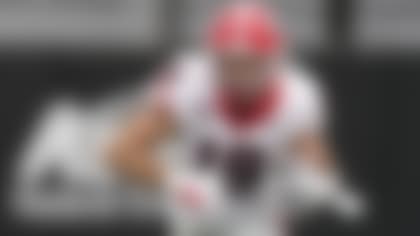The hardest selling job in the world is to convince a quarterback that you're moving him to another position. It doesn't make a difference what you say to him -- you can tell him you'll double his salary. No quarterback wants to move.
In recent years, several college quarterbacks have had to be sold on this idea, and for some it has paid off, for others it hasn't quite worked out. Last year it was Denard Robinson, who played quarterback at Michigan before moving to running back and wide receiver in the NFL. This year, Jordan Lynch of Northern Illinois is among a group of players whose future at quarterback has been questioned but who have enough talent to make an impact elsewhere.
Hot 100 seniors
In his midseason update of the top 100 seniors in college football, Gil Brandt has UCLA LB Anthony Barr No. 1 and a previously unranked player in his top 5. **More ...**
Switching positions is not a new phenomenon in football, and it certainly isn't unique to quarterbacks. As far as I'm concerned, the guy who started the trend was Sam Huff, who was a defensive lineman at West Virginia before being drafted in 1956 by the New York Giants as a linebacker, where he went on to have a Hall of Fame career.
During my time with the Dallas Cowboys, we did exceptionally well signing players where a change of position was involved. One of the many that come to mind is Rayfield Wright, who played safety at Fort Valley State before we drafted him as a tight end in 1967. A year later, we moved him to right tackle, where he was a fixture of the team, using his tremendous size and long arms to make six Pro Bowls and eventually the Hall of Fame.
When you move a player, what you're looking for is a prospect who has one or two redeeming skills or qualities that lead you to believe he's got potential at another position. For Wright, it was those extremely long arms. For Huff, it was his natural football instincts. For many others it's their incredible speed. Something about him has got to stand out and convince you he's worth developing.
Many years ago I scouted a talented wide receiver from Stanford. Toward the end of the game, he was asked to play safety and made a tremendous play, leaping to deflect a pass to save a touchdown. After the game I approached the player and told him he was wasting his time as a receiver.
"You need to be a safety," I said.
To this day, that player, a Hall of Fame wide receiver named James Lofton, still kids me about it when I see him: "Still think I should've been a safety?"
I've been wrong about position switches before, but here are nine prospects I believe should consider a change when they move on to the NFL, including a couple who have already been moved this season.
QB Logan Thomas, Virginia Tech
I mentioned that in order for a player to make a switch in the NFL, he's got to have a few good things going for him as far as skills go. At 6-foot-6, 256 pounds, with a strong arm and 4.68 speed, Thomas has got a lot of things going for him. They're just not as a quarterback. Many smart people believe Thomas will be worth taking a chance on as a QB in the NFL, but I don't see it. He just hasn't shown the type of accuracy or consistency you want to see at the position in his four years at Virginia Tech.
What's interesting about Thomas is that he was one of the top tight-end prospects coming out of high school and played in the U.S. Army All-American game in 2008 before being shifted to quarterback in college. If I were still with the Cowboys, I would draft Thomas, but I would work him out and see how he caught the ball and ran routes. It's my opinion that he would have a much better chance of being a longtime NFL player at a position other than quarterback.
CB Lamarcus Joyner, Florida State
Joyner began his career at Florida State as a safety, but the Seminoles have been breaking him in as a cornerback this season, and that's where I see him playing in the NFL. At 5-8, 187 pounds, he really reminds me of Antoine Winfield with his height and aggressiveness. Joyner is a very, very tough tackler, and he's really good in coverage.
DT Chris Whaley, Texas
Whaley was the best running back in the state of Texas five years ago, but the Longhorns just didn't think he was quick enough to be a running back and moved him to defensive tackle. Henry Melton, now a star on the Chicago Bears' defensive line, made a similar move after being a short-yardage fullback for the Longhorns for a while. He was moved to DT and last year he went to Pro Bowl. Whaley isn't as good as Melton, but he's proof that the difficult RB-to-DT switch can be done.
QB Kain Colter, Northwestern
Colter is very talented, but most don't view him as a quarterback prospect because of his height -- he is listed at 6-0 but is actually 5-10 1/2 -- and the fact he doesn't have great passing skills. Seahawks QB Russell Wilson has been an exception among shorter QBs, but you'll go broke looking for exceptions. I think someone will draft Colter and make a slot receiver out of him. He'll have to prove he can catch the ball and go through some other receiver drills, but he's a good player. Somebody will take him.
DE Cassius Marsh, UCLA
Marsh is a very good hand-on-the-ground, rush-the-passer type of defender, but I think that he can probably be a guy who can drop back and excel in coverage as a linebacker. It's a difficult switch to make, because some guys just can't play in space. You don't really know if a player can do it until you take a chance and see, but that would be my projection for Marsh. I think he's well suited to play linebacker, and it would make him a more valuable defensive player.
DT Ra'Shede Hageman, Minnesota
One of the most important things you need to do as a defensive tackle is to get low. Hageman is 6-6 3/4, which makes him too tall to play the position in the NFL. He might need to move to defensive end, but teams would have to see if he has the proper burst coming off the end to rush the passer. This requires entirely different mechanics from those of a defensive tackle, so it'll be interesting to see if Hageman can do it.
QB Jordan Lynch, Northern Illinois
Lynch has had a pretty successful college career, and it won't be easy convincing him he can no longer play quarterback because you want to try him at running back. But that could be where he winds up. His situation reminds me a little of Dan Reeves, whom the Cowboys signed as a QB out of South Carolina in the 1960s. Reeves had a much better feel for running the ball and was moved to running back. In his second season, he set the Cowboys' single-season record for touchdowns with 16, a mark he held for many years.
QB Denarius McGhee, Montana State
At 5-11 1/4, 212 pounds, with 4.6 speed, McGhee is a well-built player who moves around very well. He is from the Dallas area but went to Montana State because he wanted to go somewhere where he could play quarterback. I think he is a prime candidate for a change of position, and it could be as a RB or as a safety.
TE Trey Burton, Florida
Burton is 6-2 1/4, 226 pounds and is playing tight end for the Gators, but he's someone I would want to try at another position. With his 4.65 speed, he looks as though he has the quickness needed to be a running back in the NFL. I would also want to give him a look as a safety.
Three Week 11 games that interest me
LSU at Alabama: This will be a higher scoring game than people think. In its last three games, LSU's defense has allowed 494 yards to Georgia, 525 yards to Ole Miss, and 468 yards to Mississippi State. Everyone talks about how Alabama's offensive line is not as good as it was last year, but consider this: At this time last year, the Crimson Tide had allowed 17 sacks; this year, they have allowed only seven sacks. I think they'll be able to pass the ball against LSU and like Alabama to win, 23-14.
Texas at West Virginia: The Longhorns rarely play in the Eastern time zone; the last time was in 2007 against Central Florida. West Virginia is very good at home, and earlier this year the Mountaineers beat Oklahoma State, which was a top-10-ranked team at the time. I think Texas wins this, though, 35-34. The Longhorns' edge in special teams should be the deciding factor.
Vanderbilt at Florida: Will Muschamp of Florida is an outstanding young football coach who is on the hot seat right now. The Gators are 4-4, and a loss Saturday could put a bowl bid in jeopardy, with tough games against South Carolina and Florida State remaining. Vanderbilt has lost 23 straight to the Gators, but I think this will be close. Florida 27, Vanderbilt 24.
Upset special
Arizona over UCLA: The Wildcats' average home win this season is 36-12, and the Bruins aren't a good team on the road, where they generate 54 fewer yards per game. Wildcats QB B.J. Denker has played very well over the last four games, going from being a sub-50 percent passer to a 65 percent passer. I like him to lead Arizona past the favored Bruins.
Follow Gil Brandt on Twitter _@GilBrandt_.













